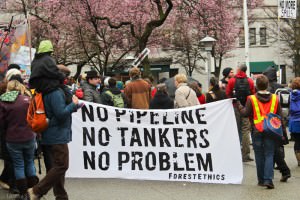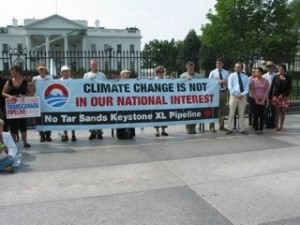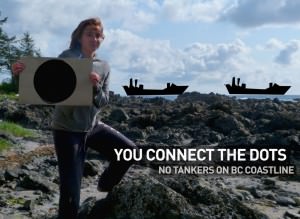Oil, Pipelines, and First Nations: When Ecological and Economic Interests Collide
Canada’s “lifeblood” comes under fire, fuelling protests from First Nations and environmentalists
Written by Luis Fernando Arce, Chief Interviewer
Although for the latter half of this decade there have been three major pipeline companies transporting bitumen from the Tar Sands in Alberta and proposing expansions to their current pipeline-routes, most people have probably heard more about only two, if they’ve heard anything about the third at all.
Trans-Canada currently finds its Keystone XL expansion project blocked in the United States, greatly due to the uprising that took place in Washington D.C. last summer (2011), where over 1200 people including environmentalists, scientists, First Nations leaders, writers and other citizens were arrested. Enbridge’s Gateway Project is facing a similar fate here in Canada due to the opposition to it from similar groups who cite a rather poor safety record (800 spills between 1999 and 2010). These two companies and the development of their respective proposals have been covered by the media for many years now.
Surprisingly, however, the proposal to “twin” the Trans-mountain pipeline, which from 1953 until 2005 was owned by Terasen Gas in B.C. and transported natural gas, has until recently been receiving relatively little media attention despite its staggering economic projections. But with an overwhelming opposition growing as the wind blows, it has begun to come into the limelight.
The ARB made contact with a spokesperson from Kinder Morgan Canada as well as with a member and prominent voice of the opposition in order to set the record straight about the proposed plans.
Titillating Economic Projections
In 2005, Kinder Morgan began transporting crude oil from the Tar Sands through the Trans-mountain pipeline. Immediate commissioning of 11 new pump-stations allowed the pipe’s capacity to increase from 225,000 to 260,000 barrels per day (bpd). In 2008, through its first expansion, the Anchor Loop Project, it increased its capacity once again to 300,000 bpd. That same year a bewildered Vancouver citizen saw an Aframax oil tanker (capacity: 650,000 barrels) going past Canada Place and reported it to the Vancouver City Council, which reacted just as baffled.
[pullquote]The twinning project is expected to increase Canada’s 2012 GDP by $5.6 billion[/pullquote]Around this time, spokesperson Ian Anderson announced that they would be expanding to “Far-East Markets.” That was also the first time Rex Weyler, Co-founder of Greenpeace International and one of the prominent voices of the opposition, “or anyone [he] knew heard about the intention to expand tar sands crude to the coast via [the Trans-mountain pipeline].” Before that, things had happened so smoothly that no one had noticed – certainly not the media. But now that opposition to the project has grown out of containment, the company has declared its intentions publicly, lauding its strong economic projections.
The $4.1 billion project is supposed to increase the number of barrels transported from Alberta to British Columbia from the current 300,000 to over 750,000 bpd. According to the company’s website, it is the only pipeline system that ships oil to the West Coast, including places like “California, the U.S. Gulf Coast and overseas through the Westridge Marine Terminal located in Burnaby, B.C.” It also supplies 90% of fuel to that province.
Kinder Morgan furthermore “transports over 680,000 bpd of petroleum products to markets in Canada, the United States and offshore” in Aframax oil tankers, says their website, which will have to switch to Suezmax tankers (capacity: 1,000,000 barrels) should the expansion go through. In particular, the offshore interest comes from swollen demand in China, which is why they are looking to expand and possibly dredge the Burnaby Inlet, stated a CTV video-report in January of this year.
Lexa Hobeshield, External Relations spokesperson for Kinder Morgan Canada, told me that the twinning project is expected to increase Canada’s 2012 GDP by $5.6 billion, after spending an estimated $6.6 billion in goods and services.
“We also forecast the labour income to increase by $3.6 billion,” she said, “and create 46,000 person-years of employment.” Overall, economic benefits of direct project expenditures are deemed positive, she stated.
“More than half of the expenditures will be in B.C., with the remaining expenditures in Alberta and Saskatchewan…generat[ing] revenues for all three levels of government.”
Not surprisingly, these projections have been titillating to interested parties, particularly since they’ve cited a “shortage of capacity” to transport all of the 1.3 million barrels produced daily in Alberta, which has depressed crude oil prices for Canadian oil producers and has reduced tax revenues for both province and country. Indeed, professor of empirical economics at the Sauder School of Business, Werner Antweller, has suggested that there is quite a lot of money to be made by Canadian oil producers with the development of the Tar Sands.
But the opposition to the Kinder Morgan pipeline has grown in numbers and influence, dismayed at what they claim is an utter lack of consultation and terrified of the effects that an imminent oil spill will have on the environment, the ecology and marine systems, and on the people, all of which, they say, can already show the toll of the Tar Sands.
Who is the Opposition?
A large conglomeration of environmentalists, First Nations and Aboriginal Communities, farmers unions and concerned citizens in general both in Canada and the United States have risen in protest to these plans, allowing none of the economic benefits to wane their concerns over the environment and their communities’ health.
Weyler told me that in Canada the “environmental groups are following the lead of the First Nations and indigenous groups.” The Tsleil-Waututh Nation on Burrard Inlet – the ‘People of the Inlet’ – and their Salish relatives, the Squamish and the Musqueam, are the “primary groups impacted by the Kinder Morgan pipeline.” The latter of the three has already signed the ‘Fraser River Declaration,’ which contains signatures from 61 different First Nations, all opposing any development of the Tar Sands on their traditional territories; the “Tsleil-Waututh and Squamish are consulting their own people on how to respond.” The overall movement, he told me, is being led by both the Yinka-Dene and Coastal First Nations Alliances.
Among the leading environmental groups, he shared, are Wilderness Committee, Tanker Free BC, Greenpeace, West Coast Environmental Law, EcoJustice, and Council of Canadians.
In the US, the Lakota nations and 350.org have been responsible for much of the oppositions’ organization, including the protests in Washington D.C.
All of these groups have come together to rally, protest and demonstrate in any way possible the very simple message that “[they] aren’t looking for half-measures [and that they] intend to stop these pipelines and the oil tankers on [their] coast.”
Weyler told me that if need be, people here and across the border are willing to be arrested “to protect their communities, land, water, and coastlines,” and assured me that “there will be people blockading oil tankers if nothing else works.”
[pullquote]110,000 litres (70 barrels) of crude oil spilled from a storage tank at the Sumas Mountain facility[/pullquote]Economic Prosperity in Perspective
Hobeshield assured me that Kinder Morgan’s “safety record speaks for itself,” boasting over 60 years as a leader in energy transportation and a sophisticated safety approach.
“The Company uses a multi-layered approach to pipeline safety that includes comprehensive damage prevention, pipeline integrity management and emergency response programs,” she told me.
Moreover, she ensured that “Kinder Morgan has effective spill response established through its own preparedness, and through its coordination with other emergency response agencies in the area – and in particular with its contracted responder, the Western Canada Marine Response Corporation.” She also suggested that combined with “the Government’s additional commitment and funding to marine safety,” they would be able to maintain these areas safe.
In the case of a spill on land, she said, “Kinder Morgan would take the responsibility for responding and clean-up,” holding responsible the “party found liable who would then be required to pay for damages.” If it happened on water, a similar liability-clause would be in place, and “the carrier of the product would be responsible for clean-up.”
In regards to the spill earlier this year in January in Abbotsford, B.C., where 110,000 litres (70 barrels) of crude oil spilled from a storage tank at the Sumas Mountain facility, Hobeshield assured me that the spill “was fully contained on [their] property.” She also declared that “the containment worked exactly as designed and all of the oil was recovered on the same day as the release,” avoiding therefore any injuries or threat to the public, and that precautions have been taken to avoid future similar scenarios. These include “an enhanced early notification system that will send automated calls should there be need, odour and air quality monitoring, as well as enhanced early detection” through the use of in-line inspection tools such as “smart pigs,” among others, that monitor the inside of the pipelines and report irregularities.
She also mentioned that “for almost 60 years, the 1150 km existing Trans Mountain Pipeline system has been operating safely…” However, oil products only began running through the pipeline after 2005, when Kinder Morgan bought Terasen Gas Inc.
In fact, since 2005 multiple red flags have been raised in regards to their safety record.
Reports by multiple publications cite a bad record, including a 2012 report by Sightline’s Eric de Place which notes that over the years, accidents in North America from Kinder Morgan oil and gas pipelines have resulted in “deaths, felonies and environmental disasters.”
There is tangible proof too.
The Thunderbird, the publication at the Graduate School of Journalism at the University of B.C, reports that after a pipe was accidentally struck by a worker in Burnaby B.C. in 2007, an investigation led by the Transportation Safety Board of Canada found about 1500 barrels of oil had been “released…into the surrounding neighbourhood;” it was the same year that the company “began to ship tar sands bitumen through Burrard Inlet on crude oil tankers,” said Weyler. On May 2009, “a storage tank at Kinder Morgan’s Westridge Terminal in Burnaby leaked more than 1900 barrels of crude,” reports The Thunderbird. And again on April 2011, the pipeline leaked around 70 barrels near Chip Lake, Alberta. The latest incident in Canada is the Abbotsford one. Multiple reports of pipeline leakages and other accidents across the border are also very well documented in various publications both mainstream and alternative.
Thus, for Weyler and the members of the opposition, a spill is more a matter of ‘when’ than ‘if’, and that is simply too jeopardizing.
What Happens when there is a Spill
In the CTV video report cited above, members of the Tsleil-Waututh Nation show rocks along the shore of North Vancouver covered in “blobs of tar,” which they say are the regularly found remnants of an oil spill in the 1950s. They also state that a few weeks prior to that interview, a “mystery spill” had washed up on their shore yet again.
Ernie George, member of the Tsleil-Waututh, exclaims with sadness that “the inlet is in peril and…dying.” Carleen Thomas, also a member, remarked that “the risk is too great.”
Indeed, Weyler told me that the grim lessons drawn from the 20,000 barrels of bitumen spilled into the Kalamazoo River in Michigan by an Enbridge Pipeline in July 2010, are that “bitumen, diluted with condensed gas and/or volatile solvents such as naphtha, separates in the water. The volatile gases – toluene and the carcinogen benzene – are released into the air [and are] causing headaches, nausea, dizziness, coughing, and fatigue among the local population. Other animals that breathe the air likely experience similar symptoms. In the Michigan experience, the toxic fumes remained for weeks, and could be smelled up to 50 kilometres away. Two years after the Michigan spill, 30 miles of the Kalamazoo River remain close to fishing, swimming, or even wading in the water.”
He continued: “Meanwhile, the heavy bitumen sinks. Clean-up crews in a bitumen spill have to battle toxic fumes as well as bitumen sinking below their skimmers. In a marine environment, the heavy bitumen sinks, moves with wind and tides, covers the marine bottom-life, mixes with the sediments, impacts the shellfish, and kills ocean plants, fish, and marine mammals.
“Bitumen crude oil also contains sulphur, paraffin, asphaltic, benzene, and other compounds that have toxic effects on plants and animals. Polycyclic aromatic hydrocarbons (“PAHs”) in bitumen dissolve in the water. These toxins contaminate wetlands or marine ecosystems and leach into the substrate. In the marine ecosystem, these toxins disrupt the food chain at its base with the loss of photoplankton and marine biofilm that forms on mudflats – the bacteria, diatoms, and mucopolysaccharides that provide a high-energy food source for shorebirds.”
Many of us may still remember the Exxon Valdez Spill that poured over 250,000 barrels into the coast of Alaska. Empirical scientific evidence has time and time again proven that the ecology and marine life that were affected by the spill still have not recovered and show no signs of doing so in the near future. Similar continuing devastation has been the result of the more recent BP underwater spill.
This type of environmental contamination has dire effects, many of which the people from the Chipewyan First Nation, downstream from the Alberta Tar Sands, have deeply felt, according to Weyler.
“[They’ve] suffered cancer increase, new or unusual cancers, lung problems, and other health impacts,” he told me.
Backed by photographs and videos of fish caught downstream from the Tar Sands plagued with “deformities, tumours, infections and signs of disease,” Weyler tells me that the Chipewyan people, elders, health experts, industry and independent studies – as well as Government studies – have all agreed on the overwhelming evidence that nearby oil sands activity has led to “environmental toxicity…that far exceeds safe and acceptable levels.”
The Chipewyan people have also complained that the tar sands development disturbs traditional hunting, fishing, and public gatherings.
[pullquote]It…appears that Kinder Morgan intended to proceed without consultation with…the Indigenous Nations…or with the citizens of Vancouver or their political representatives[/pullquote]Lack of Consultation
To add insult to injury, the opposition is also protesting what they consider lack of transparency in the company’s undertakings.
Echoing something that How To Boil a Frog producer/writer Jon Cooksey told me a few months back, Weyler stated that since 2005, when Terasen Gas was bought, until this year, no consultations with the Tsleil-Waututh had taken place before any of the projects or expansions had occurred. These included “buying and flipping” the company, as Weyler and Cooksey put it, retaining the pipelines, converting them to ship tar sands bitumen instead of gas, shipping crude oil through the Burrard Inlet on crude oil tankers and finally the 2008 Anchor Loop Project.
I asked Hobeshield if she could comment on these allegations, to which she responded:
“Kinder Morgan Canada views the Crown’s obligation for Aboriginal consultation as an opportunity to demonstrate the recognition and respect for the constitutionally-protected rights held by Aboriginal peoples. The Company is pleased to support a meaningful consultation process.
“That being said, we have regular and open communications with First Nation communities that may be affected by our operational activities. We have been seeking the opportunity to meet with Tsleil-Waututh for some time now. While they have advised they are not ready to meet with us yet, we stand ready to provide information to them and to meet with them at any time.”
However, Weyler stated, “the problem that Kinder Morgan now has with the Tsleil-Waututh is a result of failure to properly consult with the indigenous nation prior to their conversion of the pipeline, expansion of capacity, and introduction of crude oil tankers into Burrard Inlet, the traditional territory of the Tsleil-Waututh.
“It…appears that Kinder Morgan intended to proceed without consultation with…the Indigenous Nations…or with the citizens of Vancouver or their political representatives,” he added. But now that citizens as well as aboriginal communities have risen in solidarity against the project, “[the company has] made an attempt to meet with the Tsleil-Waututh…almost certainly – based on past experience – to offer [them] a bribe to accept the pipelines and tankers on their traditional territories.”
Weyler also stated that although there “has been some dialogue between some First Nations or individual First Nations members and oil and pipeline companies, nothing that could be called adequate consultations” has taken place.
“In Canada,” he explained, “the First Nations claim that Enbridge and Kinder Morgan have failed to provide a process to secure ‘free, prior, and informed consent’ for industrial development on their traditional territories as guaranteed by Canadian law and the United Nations’ Declaration of Indigenous People, to which Canada has signed.
“It is too late for ‘prior’ consent in the case of Kinder Morgan,” he said, “since the pipeline has been delivering tar sands bitumen to ships in Burrard Inlet since 2007. The Coastal First Nations claim that they have not been properly consulted on the plan to ship crude oil along the B.C. coast.
“It appears that Kinder Morgan now claims…that they have been ‘seeking the opportunity’ to meet with the Tsleil-Waututh, Squamish,” he added. “But this is now seven years too late.”
As of this year, according to the CTV video report, president of Kinder Morgan has already made presentations to investors that would definitely involve the widening of the channel by dredging the Burrard Inlet in order to ship the increased amounts of crude oil. Though Kinder Morgan hasn’t officially applied to be allowed to dredge, “the Port is testing samples of sediment at Second Narrows Channel to prepare for possible dredging,” stated the report.
Ben West, with the Wilderness Committee, told the reporter that “a lot of toxins and heavy metals, well above acceptable limits” will result from the dredging.
Weyler also mentioned that although the National Energy Board has led some supposedly public hearings in B.C., these have been biased “toward presumed acceptance of the projects and inadequate to gain full public response.” In other instances, they have bypassed communities altogether, such as Vancouver.
In that city, however, a one-day hearing with testimony from industry, public, and first Nations were held, he told me.
“The testimony focused primarily on marine safety, the effects of crude oil in the marine environment, frequency of oil spills and so forth. The Vancouver City Council has concluded that the risks are not worth the minor port revenues, and have passed a resolution insisting that the pipeline, oil companies and shipping companies indemnify the City for potential oil spill costs, which would come to several tens of billions of dollars.” Derek Corrigan, mayor of Burnaby, has also come out against the pipeline.
Conclusions
Weyler reassures me that “since the bitumen pipelines and tankers also threaten the land, rivers, and marine ecosystems, the movement to stop them – Nebraska farmers, First Nations, environmentalists – are not contemplating settling for ‘alternative routes’ and so forth.”
When I asked Hobeshield the same question I had asked Weyler to elicit that response – which was “how far are you willing to go? Are you ready to make any concessions?” – she responded that as “[w]ith any proposed project, there is likely some degree of opposition and [their] proposed expansion is no different. [They] understand the passion that [their] stakeholders and Aboriginal communities have for their interests and [they] will strive to address any concerns that may arise. [They] hope that all who are interested in [their] proposed project will engage in meaningful and constructive dialogue with [them].”
Asked to comment on Weyler’s claims that there haven’t been proper and unbiased consultations with First Nations now or prior to any of their undertakings, she simply repeated that “engagement with Aboriginal governments and peoples is very important for both [their] ongoing operations and any new projects…”
She also assured me that with new projects, Kinder Morgan wants to bring “First nations into the discussions at the planning and project scoping stage where their knowledge and insight about their traditional territory adds value to key decision making processes.” She added that “…even before reaching a decision to proceed with a project, Kinder Morgan took the opportunity to inform Aboriginal groups about the Trans-mountain open season process and how the results of that could potentially evolve into a project.”
When asked with what purpose was Terasen Gas bought in 2005 and why was it sold a year later, her answer was that “the Trans-mountain Pipeline is an important piece of infrastructure providing the only existing West Coast access for Canadian oil products and Kinder Morgan has always be open and dedicated to an inclusive and transparent consultation process that will oversee all aspects of the proposed expansion.”
[pullquote]Empirical scientific evidence has time and time again proven that the ecology and marine life that were affected by the spill still have not recovered and show no signs of doing so in the near future. [/pullquote]Finally, I asked her what would Kinder Morgan have to say to the people of the Athabasca, Chipewyan First Nation, who’ve reported the highest levels of new cancers due to Tar Sands development. Hobeshield answered that “safety is at the core of Kinder Morgan Canada’s business. The Company is committed to keeping its pipelines safe and protecting the public, its employees, and the environment. The Company strives to safeguard its facilities and meet or exceed all applicable federal, provincial and local regulations.”
In the streets of Toronto, people seem somewhat divided over the topic. Some argue that to continue enjoying a thriving first world economy and the many social advantages that we do, Canadians should play their strongest trump card – in this case, the Tar Sands, which they consider the blood-life of the country. For this reason, they view the pipelines and their proposed expansions as the veins that will keep the system alive.
Indeed, with over 1.73 Trillion barrels of crude bitumen in the Tar Sands (170 billion of which are recoverable with current technology and estimated to last 100 years), tremendous economic gains for the country have been cited. Job creation, economic stimulation and commercial partnerships solidified, among others.
But to those who oppose it, which as we saw is heavily concentrated among First Nations, environmentalists, farmers and regular citizens, the Tar Sands resemble more closely cancerous blood-cells, and the pipeline expansions as the varicose veins that will transport them.
Needless to say, up here in the Great North we have unmatched beauty from coast to coast, including everything from national parks and fauna to thriving aboriginal communities and their cultures. There is a lot to discover all along the frigid colds of the North, the green pastures of the Western Prairies or the untamed waters of the Eastern Maritimes.
Where do you stand on the subject? Is all of that beauty and the environment worth sacrificing for huge economic gains? Will the environment even be affected in the first place? Is it all exaggeration by environmentalists and Aboriginals? Is it manipulation or greed from Big Oil?
Let us know what you have to say about this controversial and crucial topic!
Sources:
– Interviews conducted by ARB.
Rex Weyler (Co-founder, Greenpeace International)
Lexa Hobeshield (External Relations, Kinder Morgan Canada)
External
– KINDER MORGAN
– GREENPEACE
– TANKER FREE BC
– CBC
– CTV (VIDEO ON YOUTUBE)
– VANCOUVER SUN
– NEWS 1130
– AAVAZ.ORG
– WHITE WOLF PACK (VIDEO OF DEFORMED FISH)
– WALL STREET JOURNAL
– THUNDERBIRD
– WATERSHED SENTINEL
– GLOBE AND MAIL
– BC LOCAL NEWS
ARB Team
Arbitrage Magazine
Business News with BITE.
Liked this post? Why not buy the ARB team a beer? Just click an ad or donate below (thank you!)
Liked this article? Hated it? Comment below and share your opinions with other ARB readers!


































Share the post "Oil, Pipelines, and First Nations: When Ecological and Economic Interests Collide"